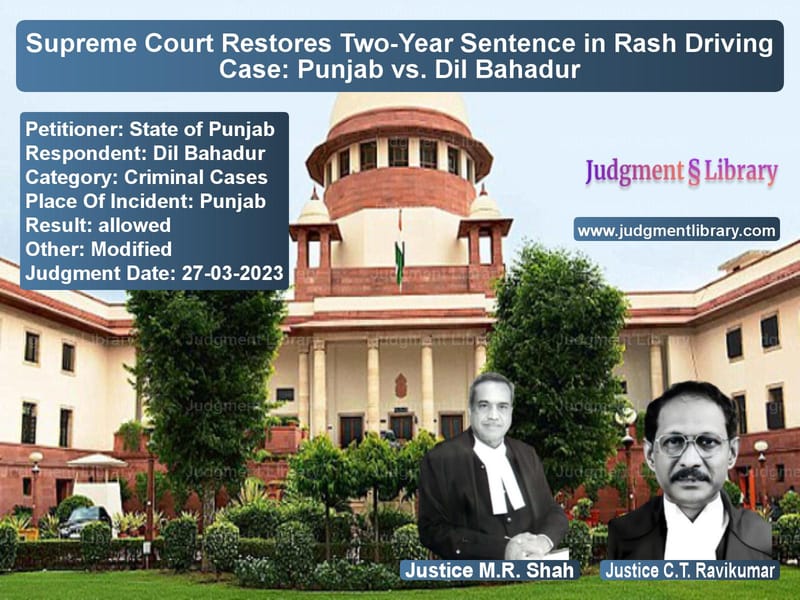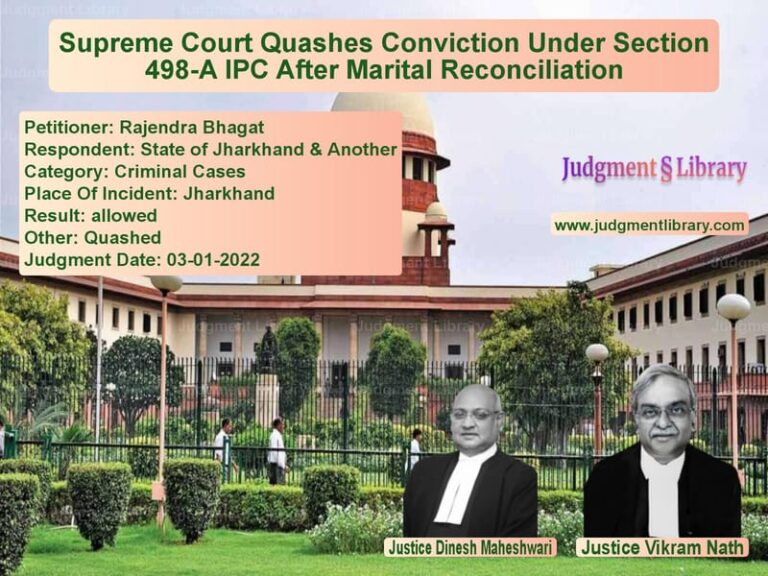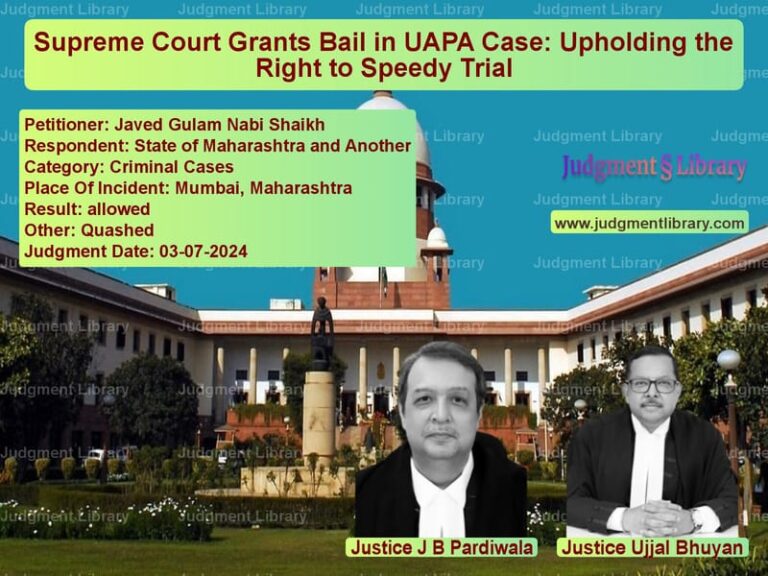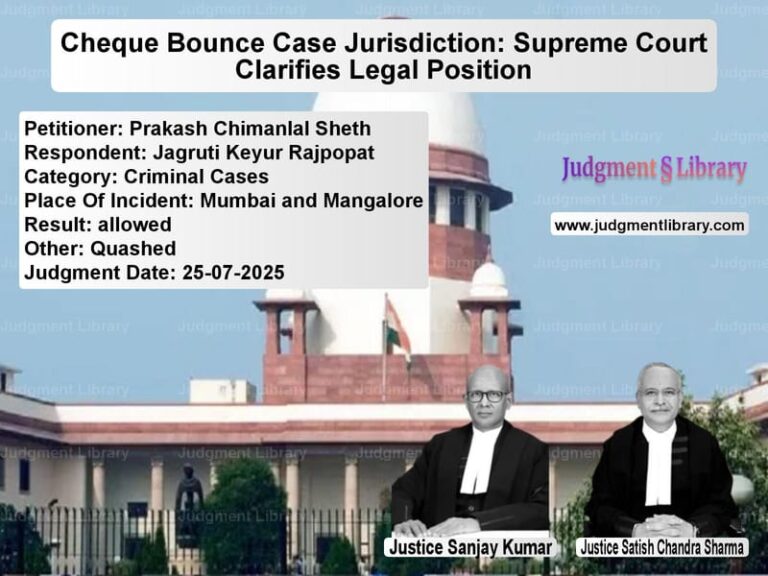Supreme Court Restores Two-Year Sentence in Rash Driving Case: Punjab vs. Dil Bahadur
The Supreme Court of India recently overturned the Punjab and Haryana High Court’s decision to reduce the sentence of Dil Bahadur, who was convicted of causing death due to rash and negligent driving under Section 304A of the Indian Penal Code (IPC). The Court reinstated the original two-year sentence imposed by the trial court, emphasizing the importance of strict punishment for reckless driving to maintain public confidence in the justice system.
Background of the Case
The case arose from a tragic accident caused by Dil Bahadur, who was driving a Scorpio car in a rash and negligent manner. While attempting to overtake an ambulance from the left side, he collided with it, causing the ambulance to overturn. As a result, one person died, and two others sustained injuries. The impact of the accident demonstrated the severity of the accused’s reckless driving.
Read also: https://judgmentlibrary.com/supreme-court-cancels-bail-of-drug-trafficking-kingpin-ajay-kumar-singh/
Following a trial, the accused was convicted under Sections 279 (rash driving) and 304A (causing death by negligence) of the IPC. The trial court sentenced him to two years of rigorous imprisonment (RI). The Sessions Court upheld the conviction and sentence.
However, the accused challenged the decision in a revision petition before the Punjab and Haryana High Court. The High Court upheld his conviction but reduced the sentence from two years to eight months, provided he deposited Rs. 25,000 as compensation to the victim’s family.
Aggrieved by this reduction in sentence, the State of Punjab appealed to the Supreme Court, arguing that the High Court had shown undue sympathy to the accused, disregarding the gravity of the offense.
Arguments by the Appellant (State of Punjab)
- The High Court erred in reducing the sentence without properly considering the seriousness of the offense.
- The accused was driving at a high speed, recklessly overtaking from the left, which resulted in a fatal accident.
- The sentence reduction undermined the principle of proportionality in sentencing and failed to consider the deterrent effect of strict punishment for road accidents.
- The High Court had inappropriately considered the accused’s financial condition as a mitigating factor, while ignoring the fact that one person lost his life and two others were injured.
- Previous Supreme Court rulings emphasized the need for stringent punishment in cases of rash and negligent driving.
Arguments by the Respondent (Dil Bahadur)
- The accused was a poor driver who did not intend to cause the accident.
- The High Court had rightly considered the economic hardship of the accused and his family while reducing the sentence.
- The accused had already undergone seven months and fifteen days of imprisonment when the High Court reduced the sentence to eight months.
- A further reduction in sentence, combined with compensation to the victim’s family, was a more balanced approach.
Supreme Court’s Observations and Ruling
The Supreme Court criticized the High Court’s decision to reduce the sentence, stating that it failed to account for the severity of the offense. The Court emphasized that:
- The accused’s reckless driving led to a fatal accident, which warranted stringent punishment.
- The High Court overlooked the deterrent aspect of punishment in road accident cases.
- Undue sympathy for the accused resulted in a sentence that did not reflect the gravity of the crime.
- The principle of just punishment is fundamental to criminal sentencing, and reducing the sentence to merely eight months did not serve the interest of justice.
- The loss of life due to reckless driving cannot be mitigated by a mere monetary compensation.
The Court referenced several previous judgments, including State of Madhya Pradesh vs. Surendra Singh (2015) 1 SCC 222 and State of Punjab vs. Saurabh Bakshi (2015) 5 SCC 182, which stressed the need for proportionate sentencing in cases involving road accidents caused by rash and negligent driving.
Referring to State of Himachal Pradesh vs. Ramchandra Rabidas (2019) 10 SCC 75, the Court reiterated that:
“The principle of proportionality between the crime and punishment has to be borne in mind. The principle of just punishment is the bedrock of sentencing in respect of a criminal offense.”
The Court also cited its ruling in Shailesh Jasvantbhai vs. State of Gujarat (2006) 2 SCC 359, where it held:
“Undue sympathy to impose an inadequate sentence would do more harm to the justice system, undermining public confidence in the efficacy of the law. Society cannot endure under serious threats of such reckless actions.”
The Supreme Court emphasized that India has an alarming record of road accidents, and courts must take a strong stance against reckless drivers. The Court rejected the argument that financial hardship should be a mitigating factor in sentencing for such offenses.
Final Judgment
The Supreme Court quashed the High Court’s order reducing the sentence and restored the two-year rigorous imprisonment originally imposed by the trial court. It directed the accused to surrender within four weeks to serve the remainder of his sentence.
Implications of the Judgment
This ruling has significant implications:
- It reinforces the judiciary’s commitment to ensuring that reckless drivers are punished proportionately to their offenses.
- It sets a precedent that financial hardship cannot be a primary mitigating factor in reducing sentences for serious crimes.
- It emphasizes the need for deterrent sentencing in road accident cases to curb increasing fatalities caused by negligent driving.
- It signals that the courts will prioritize justice for victims and their families over leniency for offenders.
Conclusion
The Supreme Court’s decision serves as a warning against reckless driving and ensures that offenders face appropriate consequences. By restoring the two-year sentence, the Court has reinforced the principle of proportional punishment and sent a strong message that public safety must not be compromised. This ruling aligns with the broader goal of making roads safer and holding negligent drivers accountable for their actions.
Petitioner Name: State of Punjab.Respondent Name: Dil Bahadur.Judgment By: Justice M.R. Shah, Justice C.T. Ravikumar.Place Of Incident: Punjab.Judgment Date: 27-03-2023.
Don’t miss out on the full details! Download the complete judgment in PDF format below and gain valuable insights instantly!
Download Judgment: state-of-punjab-vs-dil-bahadur-supreme-court-of-india-judgment-dated-27-03-2023.pdf
Directly Download Judgment: Directly download this Judgment
See all petitions in Negligence Claims
See all petitions in Motor Vehicle Act
See all petitions in Road Accident Cases
See all petitions in Judgment by Mukeshkumar Rasikbhai Shah
See all petitions in Judgment by C.T. Ravikumar
See all petitions in allowed
See all petitions in Modified
See all petitions in supreme court of India judgments March 2023
See all petitions in 2023 judgments
See all posts in Criminal Cases Category
See all allowed petitions in Criminal Cases Category
See all Dismissed petitions in Criminal Cases Category
See all partially allowed petitions in Criminal Cases Category







